Key Takeaways:
- Top Picks: MuleSoft, Informatica Cloud, Boomi, Talend, AWS Glue, SnapLogic, and more.
- Features to Look For: Real-time data processing, strong security (e.g., encryption, compliance), scalability, and pre-built connectors.
- Pricing Models: Ranges from consumption-based to custom quotes, catering to businesses of all sizes.
- Use Cases: Marketing automation, customer data unification, campaign optimization, and regulatory compliance (e.g., GDPR).
Quick Comparison Table:
| Tool | Best For | Pricing Model | Key Features | Learning Curve |
|---|---|---|---|---|
| MuleSoft Anypoint | Enterprises | Core-based | API management, real-time processing | High |
| Informatica Cloud | Mid to large enterprises | Consumption-based | Data governance, hybrid support | Moderate |
| Boomi | Flexible cloud integration | Custom pricing | Workflow automation, security | Low to Moderate |
| Talend | Advanced data transformation | Pay-as-you-go | Event-driven design, hybrid support | Moderate |
| AWS Glue | AWS ecosystem users | Pay-per-use | Serverless, ETL workflows | Low |
| SnapLogic | Marketing automation | Custom pricing | Real-time workflows, connectors | Low |
| DataChannel | Hybrid environments | Consumption-based | Real-time processing, scalability | Moderate |
These tools are essential for marketing teams to streamline data integration, improve campaign performance, and ensure compliance. Read on for detailed insights into each platform.
MuleSoft vs Dell Boomi comparison | iPaas providers
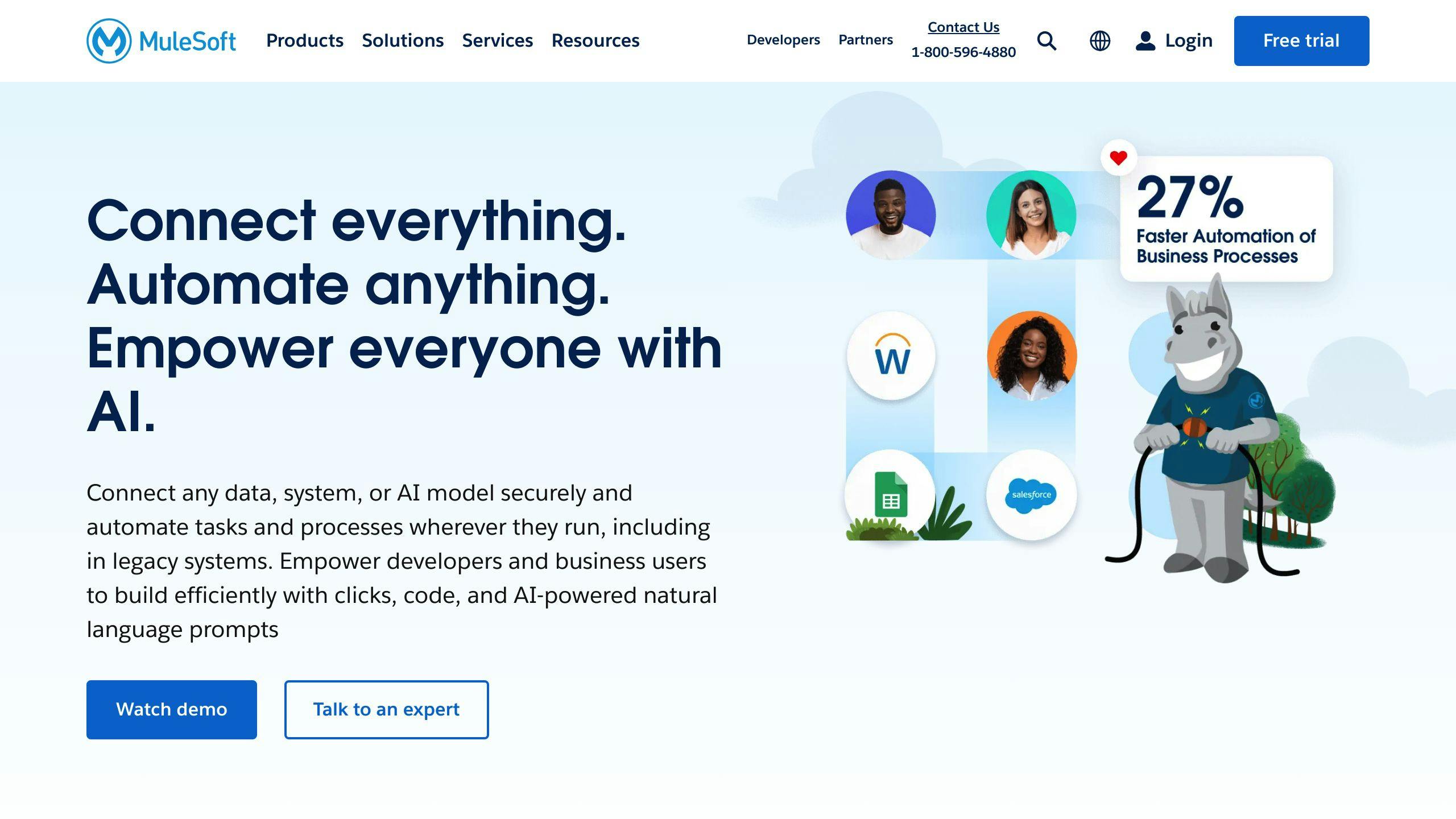
1. MuleSoft Anypoint Platform
The MuleSoft Anypoint Platform stands out as a leading cloud-based tool in 2024, designed to handle complex data integration challenges. As part of the Salesforce ecosystem, it’s tailored for businesses that need to connect multiple systems seamlessly.
This platform comes with over 200 pre-built connectors for widely used services like Salesforce, SAP, and AWS. These connectors allow marketing teams to merge data from various sources - such as CRM systems, social media platforms, and e-commerce solutions - into unified customer profiles.
Key Features:
- Real-time data processing combined with advanced API management for smooth and secure integrations
- Compatible with both cloud and on-premises systems
- Strong security measures, including encryption, compliance support, and auditing
- Access to over 200 pre-built connectors for popular platforms
With its real-time processing capabilities, marketing teams can adjust campaigns instantly, improving customer engagement. It also integrates with tools like Salesforce and Adobe, enabling dynamic campaign optimization.
MuleSoft holds a 4.5/5 rating on Gartner Peer Insights for user satisfaction [1]. However, its enterprise-grade features come with a steeper learning curve compared to simpler alternatives.
| Aspect | Details |
|---|---|
| Best For | Enterprise-level organizations |
| Pricing Model | Based on the number of processing cores used |
| Key Differentiator | Extensive API management |
| Learning Curve | High |
| Technical Support | Premium enterprise support |
Its pricing structure makes it ideal for larger organizations with advanced integration needs. For businesses considering MuleSoft, running a pilot project is a good way to assess its suitability for specific requirements.
For those seeking alternatives, tools like Informatica Cloud can address a broader range of needs with more scalability.
2. Informatica Cloud Data Integration
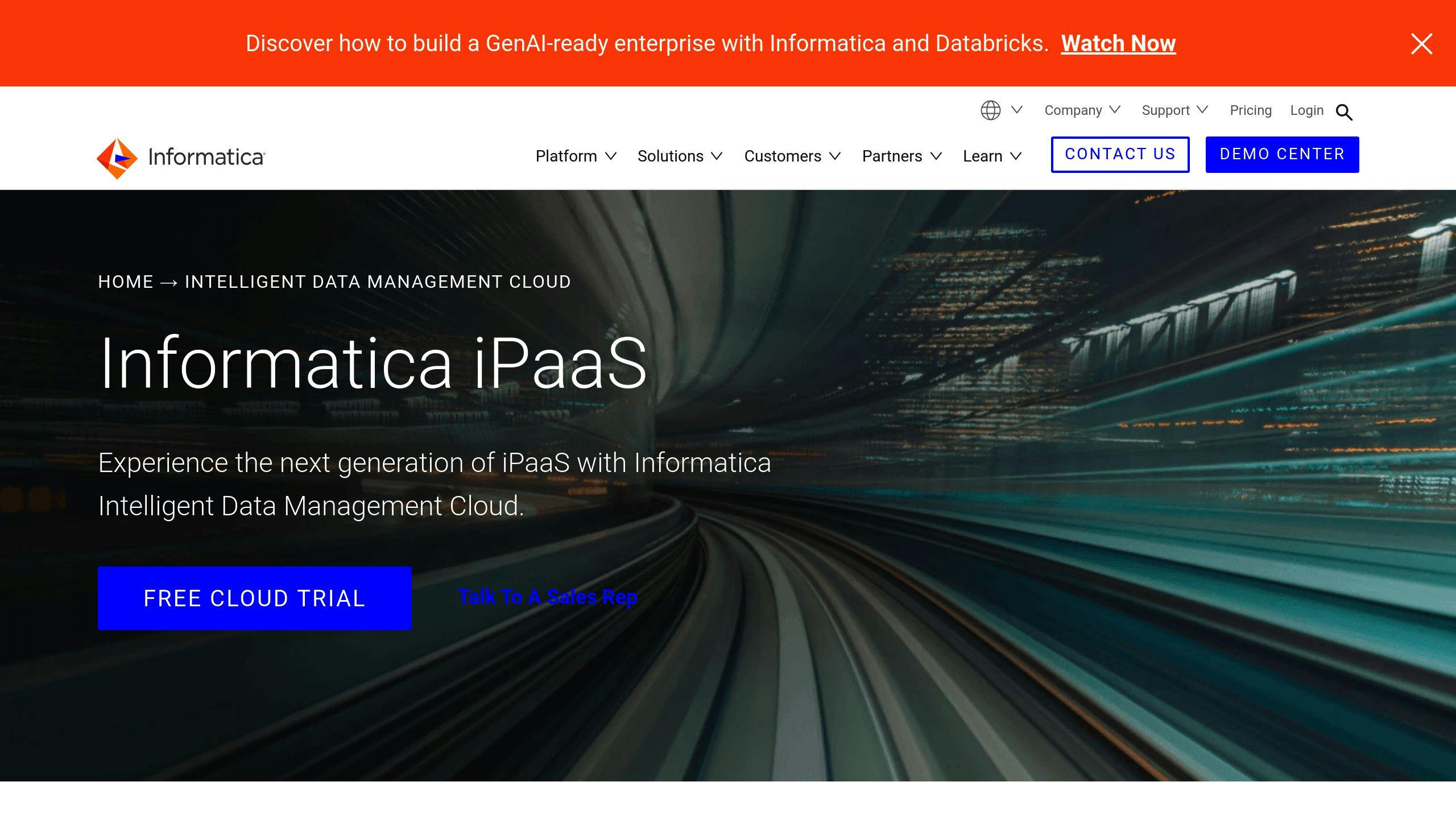
Informatica Cloud Data Integration stands out in 2024 for its ability to handle both cloud-native and hybrid environments with ease. Part of Informatica's Intelligent Data Management Cloud, this platform is designed to simplify data integration processes for organizations of all sizes.
It supports marketing automation workflows with a variety of pre-built connectors. These connectors make it easy to link marketing platforms, databases, and cloud storage services, ensuring smooth data synchronization for personalized campaign delivery.
Key Features:
- Real-time data processing with options for cloud and hybrid deployment
- Advanced data security, including masking and encryption
- Tools for maintaining data quality and governance
- An intuitive interface for managing complex integrations
Informatica is particularly strong in maintaining high data quality and governance standards while providing real-time insights that marketing teams can use. Its consumption-based pricing model allows businesses to scale their usage as required, making it a flexible option for growing organizations.
| Aspect | Details |
|---|---|
| Best For | Mid to large enterprises with hybrid environments |
| Pricing Model | Consumption-based |
| Key Differentiator | Comprehensive data management suite |
| Learning Curve | Moderate |
| Technical Support | Enterprise-grade support |
The platform’s combination of advanced integration capabilities and strong governance tools makes it a great choice for companies managing a variety of data sources. Its scalability and feature set are particularly well-suited for growing enterprises.
For marketing teams, Informatica provides immediate access to customer insights, enabling quicker, data-driven decisions. It also integrates seamlessly with existing marketing tools and analytics platforms, helping to automate workflows and improve reporting processes.
If you're looking for a more user-friendly platform with strong hybrid deployment options, Boomi is another alternative worth considering.
3. Boomi
Boomi stands out as a cloud-based integration platform as a service (iPaaS) in 2024, designed to connect cloud-native and hybrid environments effortlessly. It helps organizations bring their data together without sacrificing performance or security.
The platform's pre-built connectors simplify marketing automation tasks, letting teams concentrate on strategy instead of manual processes.
Key Features:
- Scalable processing capabilities
- Enterprise-level security with strong encryption and compliance (GDPR, HIPAA)
- API management tools for efficient integration
- Advanced workflow automation to streamline processes
Boomi's real-time data processing provides marketing teams with immediate insights. Its compliance with GDPR and HIPAA makes it a reliable option for industries with strict data regulations.
| Aspect | Details |
|---|---|
| Best For | Organizations needing flexible cloud integration |
| Pricing Model | Custom pricing based on usage |
| Key Differentiator | Large connector library and user-friendly interface |
| Learning Curve | Low to moderate |
| Technical Support | 24/7 support |
Boomi is particularly effective at integrating data from marketing tools like CRMs, analytics platforms, and email systems. This enables smooth automation of customer journeys. For instance, marketing teams can link their CRM with analytics tools to track customer journeys in real time and optimize campaigns automatically.
Though complex integrations may require some technical skills, Boomi’s user-friendly interface and automation features make it manageable for teams with diverse technical expertise. The consumption-based pricing model ensures that organizations can adjust their usage as needed.
If your organization requires tools with more specialized marketing analytics features, you might want to check out options in the Marketing Analytics Tools Directory. These can complement Boomi's integration capabilities and enhance your overall strategy.
Next, we’ll take a closer look at Talend, a platform recognized for its open-source foundation and strong cloud-native features.
4. Talend
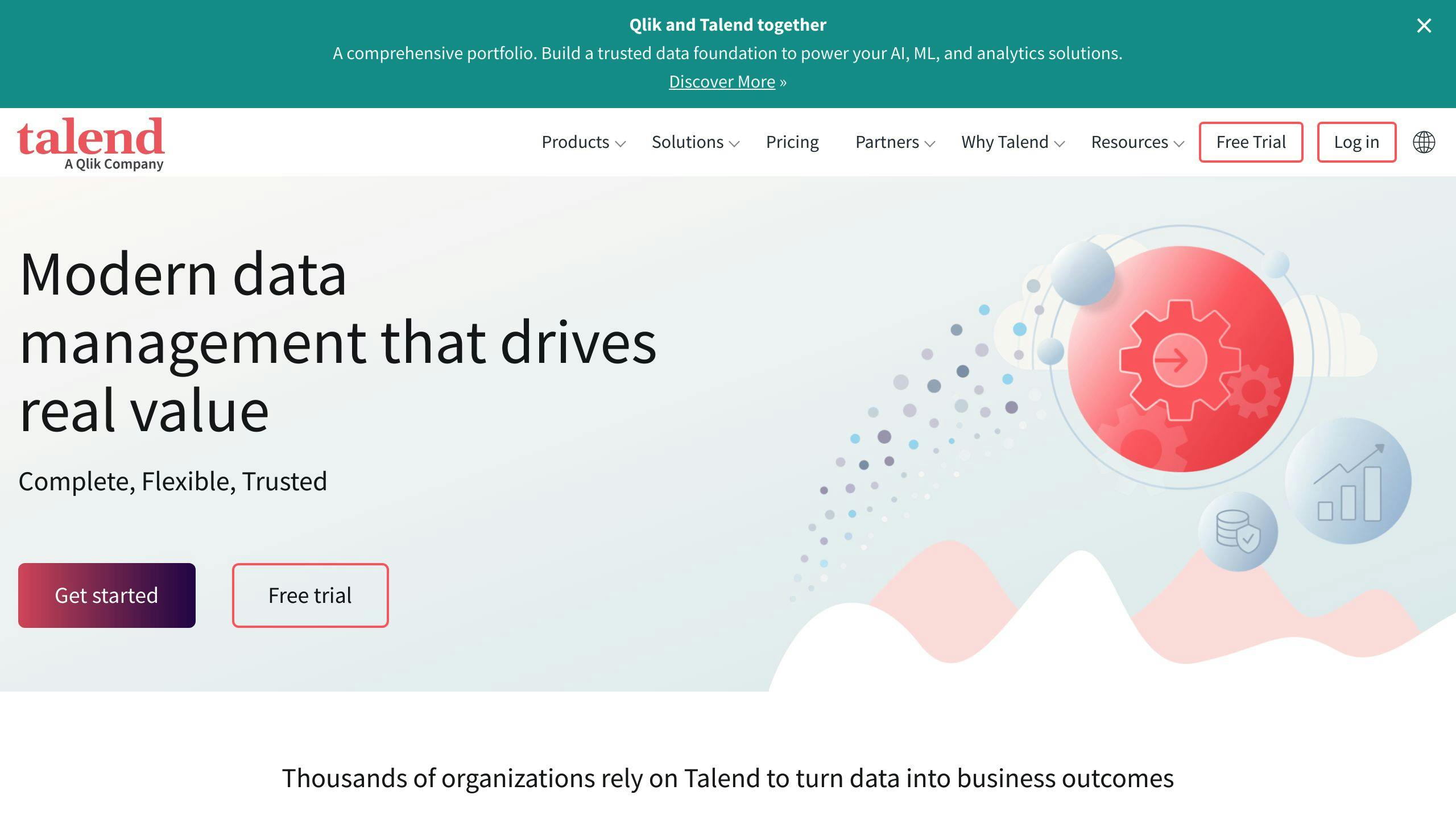
Talend stands out as a cloud-based data integration platform in 2024, designed to work seamlessly in both cloud and hybrid environments. It offers a mix of user-friendly features and advanced tools tailored to marketing automation.
Key Features:
- Native support for major cloud platforms like AWS, Azure, and Google Cloud
- A wide range of connectors for different data sources
- Distributed processing to manage large-scale marketing datasets efficiently
- Event-driven design for real-time campaign updates
- Tools for advanced data transformation, ideal for personalized marketing
| Aspect | Details |
|---|---|
| Primary Strength | Cloud-based architecture with hybrid capabilities |
| Pricing Model | Pay-as-you-go, based on data rows (via Stitch by Talend) |
| Technical Support | Standard and Business tiers with varying levels of support and setup |
| Integration Options | Includes cloud services, databases, and SaaS applications |
| Best For | Companies needing advanced data transformation capabilities |
Talend’s event-driven setup allows marketing teams to quickly turn customer interaction data into actionable insights. By connecting with e-commerce platforms and CRM systems, it processes customer behavior data in real time. This enables businesses to optimize campaigns on the fly and deliver personalized customer experiences.
The platform excels in handling complex marketing data integration tasks. It also works well with analytics tools, offering deep insights through its real-time processing and transformation features. Although some technical knowledge is needed, the platform's ability to manage large-scale operations makes the learning curve worth it for most businesses.
For companies looking to combine powerful data transformation tools with smooth cloud integration, Talend is a strong choice. It also complements other tools like IBM Cloud Pak for Integration.
5. IBM Cloud Pak for Integration
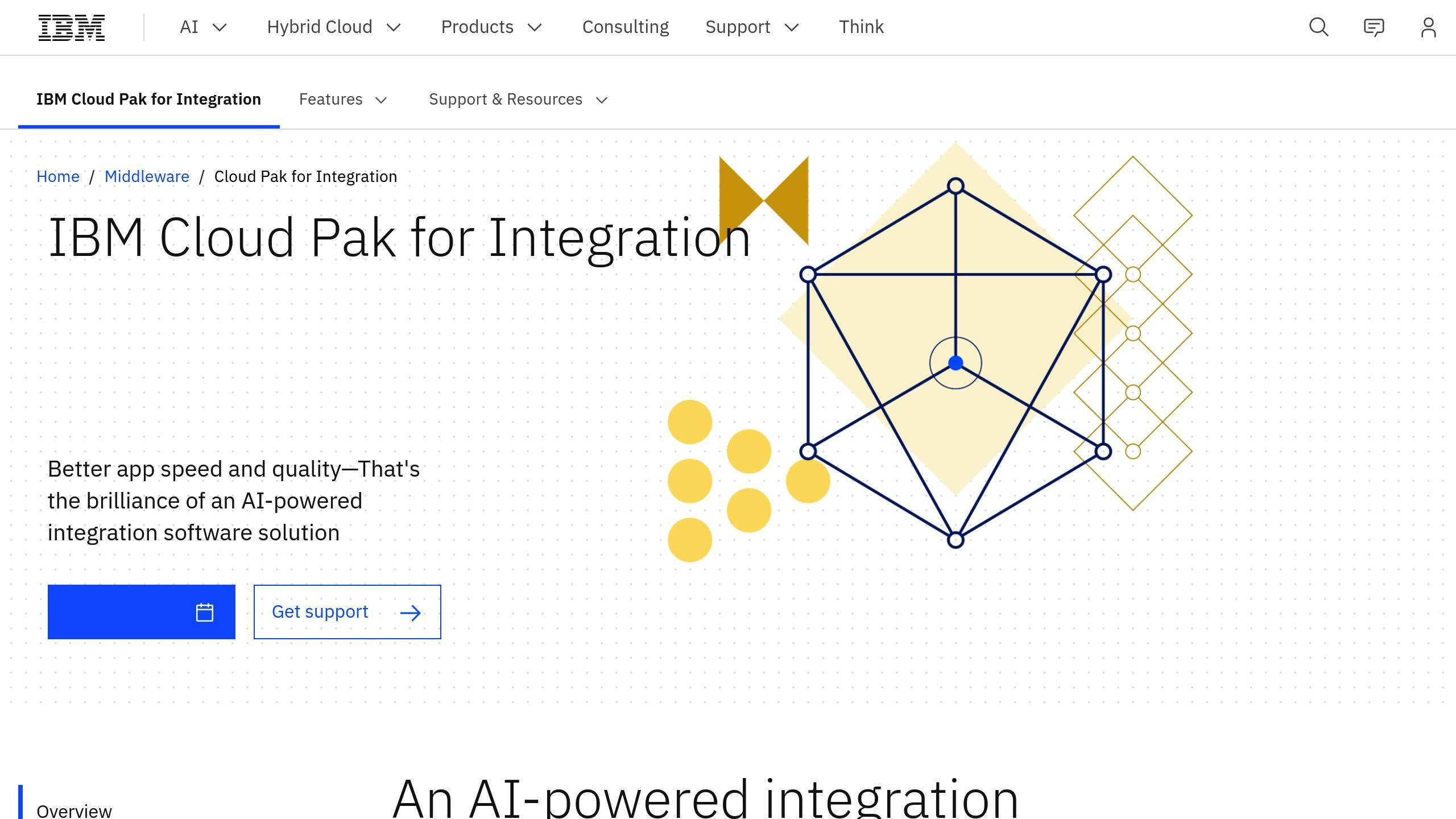
IBM Cloud Pak for Integration is designed for enterprises needing advanced data integration in cloud-native and hybrid environments. Built on microservices, it handles complex data tasks while ensuring high security and performance.
Key Features:
- Real-time data processing through event-driven architecture
- AI-driven tools for automating workflows
- Strong security measures, including encryption and access controls
- Support for containerization and microservices
- A wide range of connectors for major platforms and services
| Aspect | Details |
|---|---|
| Primary Use Case | Large-scale integration and real-time data processing |
| Performance Metrics | Up to 300% faster integration development, 50% lower integration costs |
| Architecture | Cloud-native with hybrid functionality |
| Support Options | Professional services, documentation, community forums |
| Best For | Enterprises with complex integration needs |
The platform’s containerized design ensures scalability, which is particularly useful for marketing teams managing large customer datasets. AI-powered workflows help improve campaign segmentation and customer lifecycle management, all while handling high data volumes efficiently.
It also processes real-time event data from sources like social media and IoT devices, enabling more personalized and responsive marketing campaigns. By integrating with IBM tools like Watson and Cognos, teams gain access to advanced analytics, using AI insights to make smarter decisions.
However, this platform may be too advanced for smaller organizations. Its consumption-based pricing is better suited for enterprises with significant integration demands.
"According to IBM, businesses that use Cloud Pak for Integration can achieve up to 300% faster integration development, 50% lower integration costs, and 25% improved data quality."
For those looking for a simpler yet powerful alternative, AWS Glue offers an intuitive interface and excellent scalability for integration tasks.
sbb-itb-5174ba0
6. AWS Glue
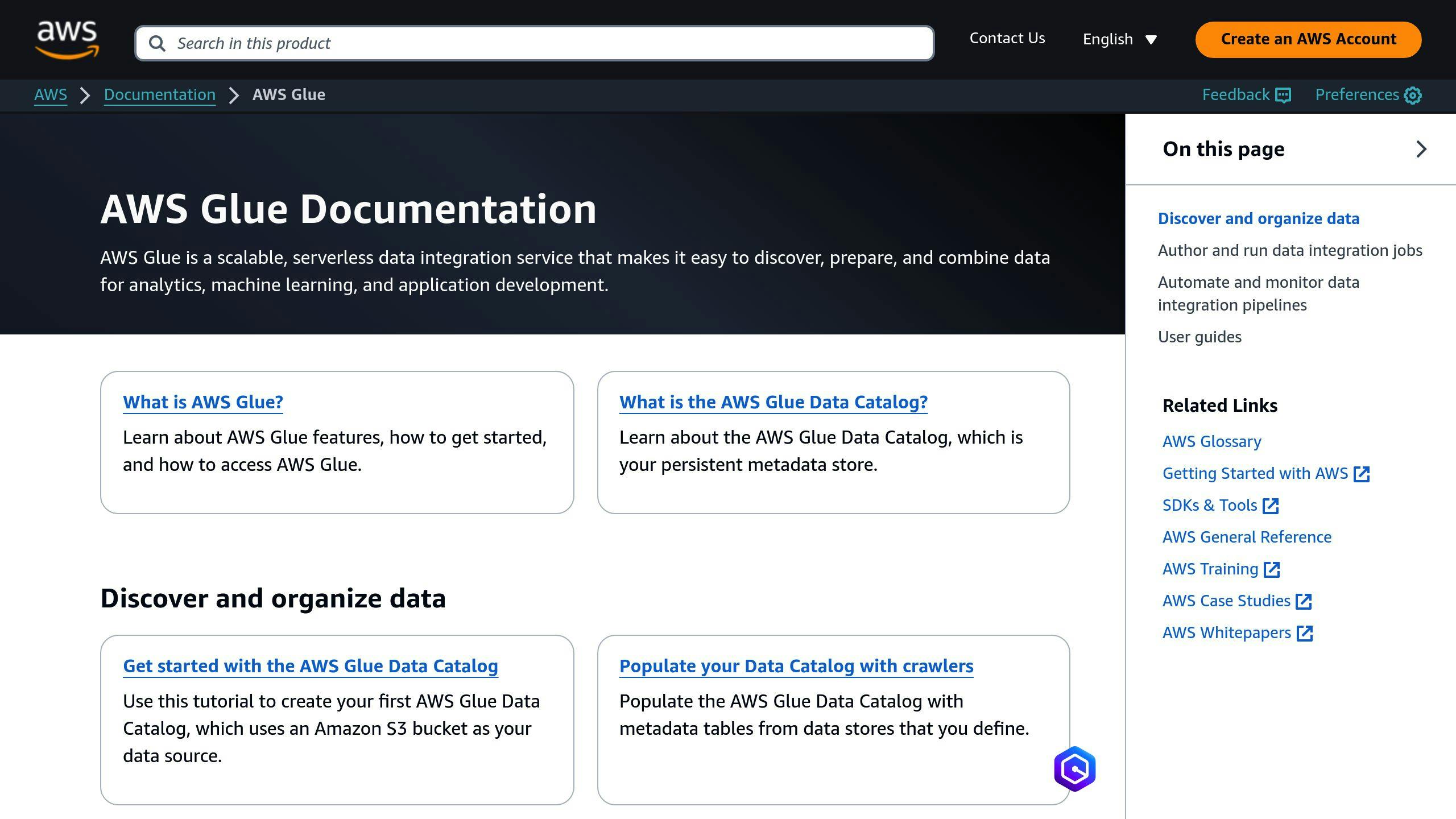
AWS Glue offers a straightforward, serverless option for marketing teams needing to handle data preparation and integration in the cloud. Unlike IBM Cloud Pak's more intricate setup, AWS Glue is designed to seamlessly work within the AWS ecosystem, making it a go-to choice for those already using AWS services.
Key Features:
- Easy-to-use visual interface for designing ETL workflows
- Works naturally with other AWS services
- Handles multiple data formats like CSV, JSON, Avro, and Parquet
- Real-time data processing for instant insights
- Tools for managing data quality and governance
| Aspect | Details |
|---|---|
| Primary Use Case | ETL processing and data preparation |
| Architecture | Serverless, cloud-native |
| Cost Model | Pay-per-use based on data processing units (DPU) |
| Integration Support | Native AWS services, databases, and data warehouses |
| Security Features | Encryption at rest/in transit, fine-grained access control |
AWS Glue makes it easier for marketing teams to integrate campaign analytics, customer behavior data, and CRM metrics, delivering actionable insights. Its serverless nature adjusts to workload demands, perfect for handling fluctuating data volumes from campaigns or customer interactions.
The platform's visual interface simplifies complex data tasks, letting marketers unify customer data without needing advanced technical skills. For example, teams can merge CRM data with social media metrics and campaign performance stats to gain a clearer picture of their audience.
Another time-saver: AWS Glue automatically discovers and catalogs data, speeding up the preparation process and enabling faster access to insights. However, it works best when used within the AWS ecosystem. If your organization relies heavily on other cloud platforms, you may need to assess whether AWS Glue fits your integration needs.
"AWS Glue's serverless model offers cost advantages by charging only for resources used, making it efficient for variable workloads."
For those needing a solution that works across multiple platforms, Informatica Intelligent Cloud Services might be a better fit.
7. Informatica Intelligent Cloud Services
Informatica Intelligent Cloud Services (IICS) is a cloud-native platform designed for data integration. Unlike AWS-centric solutions, it uses a platform-agnostic approach and offers a vast library of connectors, making it a versatile choice for businesses. It’s particularly effective for managing complex marketing automation tasks, such as creating dynamic customer profiles and running responsive campaigns across various channels.
Key Features:
- Works across multiple platforms
- Advanced data monitoring using IPUs
- Pre-built connectors for marketing platforms
- Scalable to handle different workloads
- Automated tools for GDPR and HIPAA compliance
| Aspect | Details |
|---|---|
| Pricing Model | Consumption-based (IPU) |
| Environment Support | Cloud-native and hybrid |
| Security Compliance | GDPR, HIPAA compliant |
| Integration Type | Real-time and batch |
| Scalability | Dynamic resource allocation |
The platform’s pricing is based on Informatica Processing Units (IPUs), which can be more cost-effective than fixed connector-based pricing models [2]. Unlike many competitors, IICS includes all connectors as part of the service, eliminating the need for additional licenses - a common expense with other platforms.
For marketing teams managing complex data, IICS offers a mix of strong data governance and advanced integration tools. It ensures high data quality while processing information from multiple sources, making it ideal for organizations handling sensitive customer data and adhering to strict compliance standards.
"With our cloud-native model, Informatica's connectors are free - providing you with limitless scalability and the freedom to innovate." - Informatica [2]
IICS allows marketing teams to create detailed customer profiles and automate workflows across multiple channels. That said, its extensive features require careful planning to fully leverage its capabilities and justify the IPU-based pricing.
For businesses looking for a simpler pricing structure or open-source options, Talend Cloud might be a suitable alternative.
8. Talend Cloud
Talend Cloud expands on Talend's suite, delivering a unified platform for managing data in marketing automation and analytics. Designed for both cloud and hybrid setups, it fits seamlessly into complex marketing technology ecosystems.
Key Features
- Over 1,000 pre-built connectors for easy integration
- Supports real-time and batch data processing for quick campaign adjustments
- Includes tools for data quality and governance
- Works across cloud and on-premises environments
- Offers strong security with encryption and access controls
| Capability | Description |
|---|---|
| Environment Support | Cloud-native and hybrid |
| Data Processing | Real-time and batch processing |
| Integration Types | Application, data warehouse, and streaming |
| Security Features | Data encryption, access controls, audit trails |
| Deployment Options | Multi-cloud, hybrid, and on-premises |
Talend Cloud uses subscription-based pricing, which adjusts based on data volume and connector usage, making it suitable for businesses of all sizes. Its governance framework ensures high data quality and compliance, with features like automatic data lineage tracking and enforcement of regulatory requirements.
For marketing teams, Talend Cloud simplifies creating a unified view of customer interactions by pulling data from CRM systems, social media, and marketing automation tools. This enables teams to respond instantly to customer behavior while keeping track of campaign performance.
| Use Case | Benefits |
|---|---|
| Customer Data Integration | Consolidates data into unified customer profiles |
| Campaign Analytics | Tracks and optimizes performance in real time |
| Data Quality Management | Automates data validation and cleansing |
| Compliance Management | Offers built-in governance and audit tools |
| Marketing Automation | Integrates smoothly with marketing platforms |
Talend Cloud stands out by managing complex data integrations while ensuring data quality, making it a strong choice for enterprises with advanced marketing requirements. However, proper configuration is crucial to unlocking its full capabilities.
For those looking for a simpler, more intuitive cloud-native integration tool, SnapLogic is worth considering - more on that in the next section.
9. SnapLogic
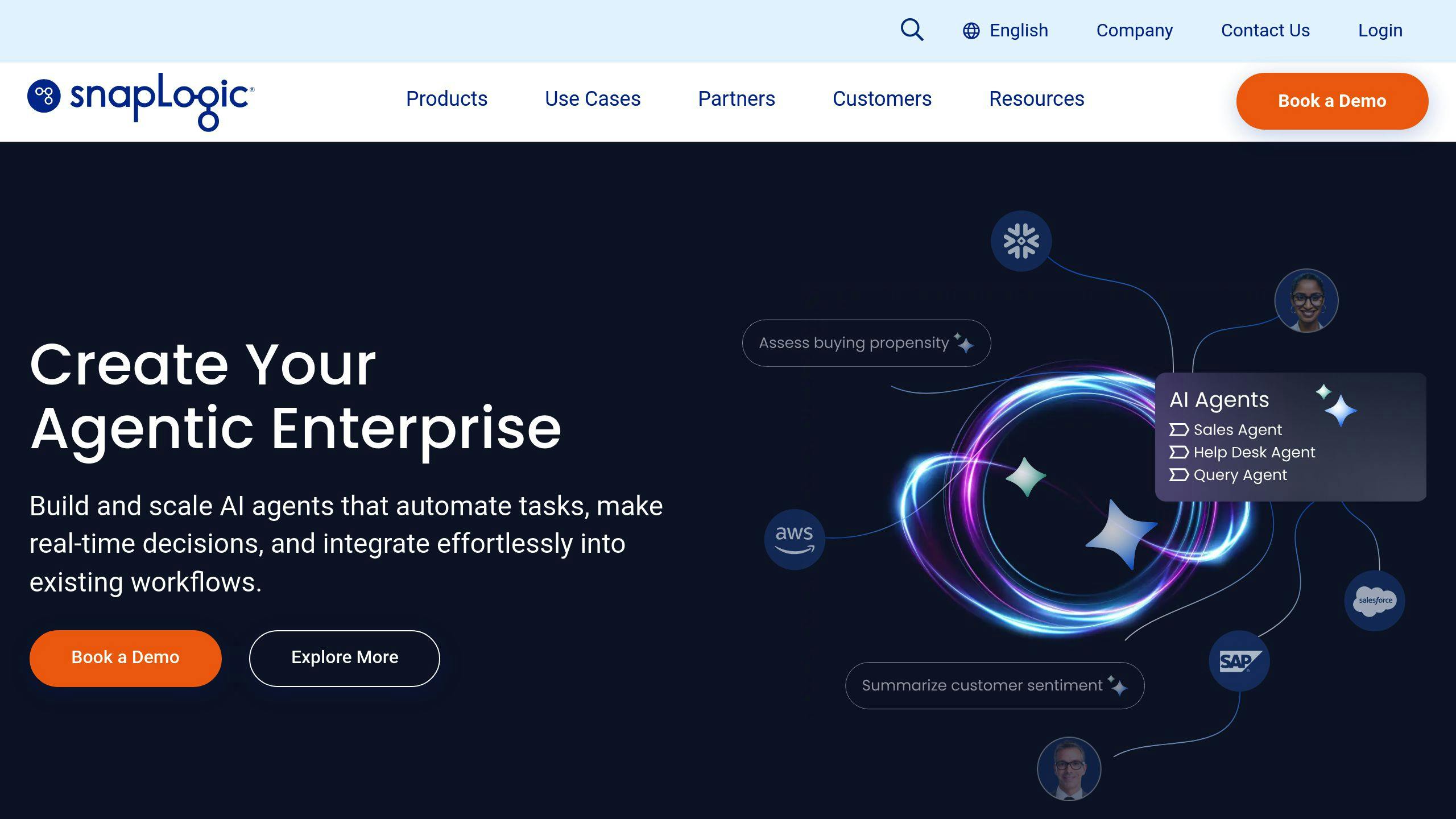
SnapLogic offers a cloud-based integration platform designed to connect marketing automation tools with various data sources. With an easy-to-use interface and a wide range of connectors, it simplifies data integration for marketing teams.
Key Features
SnapLogic's platform uses an event-driven architecture, enabling both real-time and batch data processing for marketing workflows. It integrates seamlessly with popular marketing tools through pre-built connectors while ensuring strong security measures for handling sensitive data. This is especially valuable for GDPR-compliant campaigns.
| Feature | Details |
|---|---|
| Data Processing | Event-driven for real-time and batch workflows |
| Deployment Options | Cloud-native and hybrid environments |
| Security | Advanced encryption and access controls |
| Compliance | Meets GDPR, HIPAA, and other regulatory standards |
| Connectivity | Includes pre-built connectors for major platforms |
The platform is built to handle growing data demands effortlessly. Its integration with tools like Apache Kafka and Apache Spark supports advanced processing, offering real-time insights for marketing efforts.
Marketing Integration Capabilities
SnapLogic's integrations are tailored for marketing needs, such as combining data in real time and automating campaign updates. Its pricing model, based on data usage and connectors, fits businesses of all sizes, scaling as data requirements expand.
| Function | Benefits |
|---|---|
| Customer Data | Creates unified profiles across platforms |
| Analytics | Supports real-time data aggregation |
| Campaigns | Automates data synchronization |
| Social Media | Centralizes engagement metrics |
| E-commerce | Ensures smooth order and inventory data flow |
Data Quality and Governance
The platform prioritizes data quality with automated validation and transformation tools, ensuring compliance and reducing manual work. Its AI features streamline tasks like mapping customer data, enhancing consistency and accuracy. This allows marketing teams to focus on creating personalized campaigns at scale.
For businesses needing specialized marketing data solutions, tools like DataChannel can complement SnapLogic's offerings, adding even more capabilities.
10. DataChannel
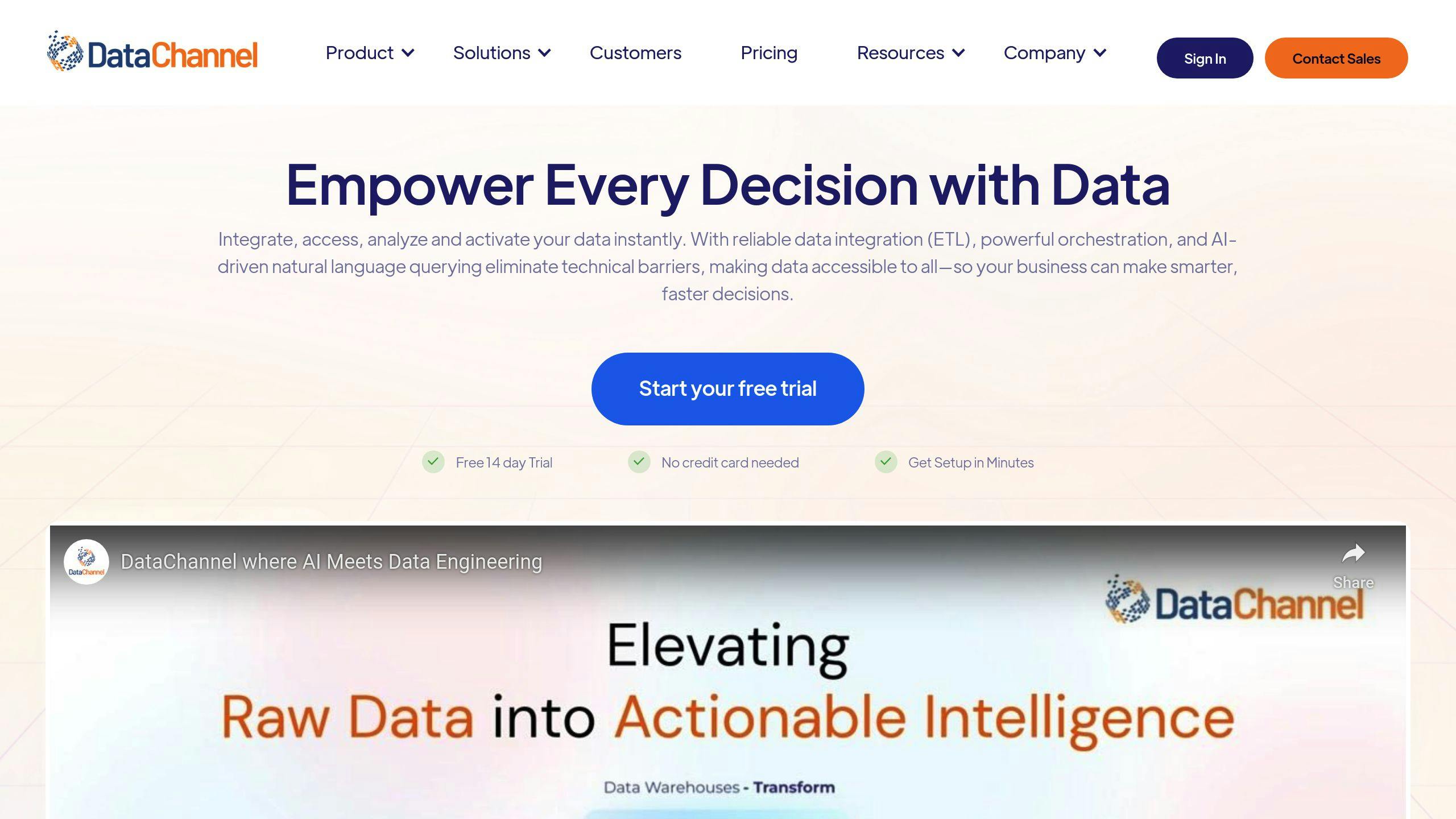
DataChannel helps marketing teams manage increasingly complex data systems by providing solutions that work seamlessly across both cloud and on-premises environments. Its cloud-based design supports real-time data processing, ensuring quick insights and smooth integration.
Key Integration Features
DataChannel offers a wide range of connectors to link databases, cloud storage, and SaaS tools, allowing marketing teams to create unified customer profiles. Its design supports hybrid environments and adapts to fluctuating data needs with ease.
| Feature | Benefit |
|---|---|
| Hybrid Environment Support | Smooth integration between cloud and on-premises systems |
| Real-time Processing | Handles dynamic marketing requirements efficiently |
| Connector Library | Works with a variety of marketing tools and databases |
| Data Security | Protects sensitive customer data |
| Scalability | Adjusts resources automatically based on demand |
Marketing Automation Tools
DataChannel supports advanced marketing workflows by enabling:
- Real-time monitoring of campaigns
- Synchronization of data across tools
- Consistent data quality across integrations
- Efficient use of resources for varying workloads
Scalability for Enterprises
With a consumption-based pricing model, businesses can easily scale their integrations based on current needs. This is especially useful for handling spikes in data processing during marketing campaigns.
| Scaling Factor | Capability |
|---|---|
| Data Volume | Automatically adjusts resources |
| Processing Speed | Supports concurrent processing |
| Integration Points | Connects to multiple data sources |
| Security Controls | Role-based access for added protection |
DataChannel strikes a balance between strong security and flexibility, making it a powerful tool for marketing teams. For those exploring analytics solutions, the Marketing Analytics Tools Directory provides a detailed comparison of similar platforms.
Its ability to integrate seamlessly with other cloud-based tools makes DataChannel a smart addition to any marketing technology stack, simplifying operations and boosting efficiency.
Comparison Table
Here's a detailed comparison of top cloud-native data integration tools for marketing automation:
| Feature | MuleSoft Anypoint | Informatica Cloud | Boomi | Talend | AWS Glue | SnapLogic |
|---|---|---|---|---|---|---|
| Starting Price | Custom quote | IPU-based | Custom quote | $1,170/month | Usage-based | Custom quote |
| Free Trial | Available | Available | Limited | Yes | No | Available |
| Deployment | Cloud, Hybrid | Cloud, Hybrid | Cloud | Cloud, Hybrid | Cloud | Cloud |
| Real-time Processing | ✓ | ✓ | ✓ | ✓ | ✓ | ✓ |
| Marketing Platform Support | Advanced | Advanced | Intermediate | Advanced | Basic | Advanced |
| Data Processing Volume | Unlimited | Unlimited | Terabyte-scale | Terabyte-scale | Petabyte-scale | Terabyte-scale |
| Concurrent Marketing Users | 1000+ | 5000+ | 500+ | 1000+ | Unlimited | 500+ |
| Campaign Data Auto-scaling | ✓ | ✓ | ✓ | ✓ | ✓ | ✓ |
Use Case Specialization
| Tool | Primary Marketing & Industry Focus |
|---|---|
| MuleSoft Anypoint | Enterprise-level campaign orchestration in financial and healthcare sectors |
| Informatica Cloud | Retail analytics and customer data warehousing |
| Boomi | Mid-market campaign integration for education and tech sectors |
| Talend | E-commerce and marketing analytics integration |
| AWS Glue | Marketing technology startups within AWS ecosystem |
| SnapLogic | Marketing automation and SaaS platform integration |
Key Considerations for Marketing Teams
- Informatica and MuleSoft offer robust enterprise-level features with flexible pricing models [1][2].
- AWS Glue is tailored for handling large-scale campaign data within the AWS ecosystem [1].
Choosing the right tool will depend on your marketing needs and the complexity of your integrations.
Conclusion
Informatica Cloud and MuleSoft Anypoint Platform stand out as strong options for enterprises needing scalable solutions, while AWS Glue offers a budget-friendly choice for those already using AWS services.
Pricing varies widely: basic plans typically cost between $500 and $1,000 per month, professional plans range from $1,500 to $3,000 monthly, and enterprise plans can exceed $5,000 for advanced features and support [1].
When evaluating options, keep these key factors in mind:
- Data Processing Capacity: Platforms like AWS Glue and Informatica handle petabyte-scale data, making them ideal for large-scale marketing operations.
- Integration Options: Tools such as SnapLogic offer no-code deployment, which is great for teams with limited technical expertise.
- Cost Considerations: Weigh both upfront and long-term expenses, as enterprise plans can be a significant investment [1].
These points can guide marketing teams in selecting the right platform for their needs. For further insights, consult the Marketing Analytics Tools Directory, which includes detailed comparisons and user reviews.
The best tool will depend on how well it matches your marketing goals, scalability requirements, and budget. Start small to test the waters, then expand as your needs grow.


